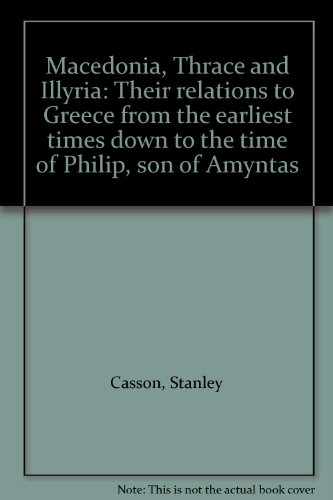casson stanley 1889 1944 (2 Ergebnisse)
Produktart
- Alle Product Types
- Bücher (1)
- Magazine & Zeitschriften
- Comics
- Noten
- Kunst, Grafik & Poster
- Fotografien
- Karten
- Manuskripte & Papierantiquitäten (1)
Zustand
- Alle
- Neu
- Antiquarisch (2)
Einband
- alle Einbände
- Hardcover (1)
- Softcover
Weitere Eigenschaften
- Erstausgabe
- Signiert
- Schutzumschlag
- Angebotsfoto
Gratisversand
- Versand nach USA gratis
Land des Verkäufers
Verkäuferbewertung
-
MACEDONIA, THRACE, AND ILLYRIA
Verlag: Greenwood Press, Westport, 1971
ISBN 10: 0837147271ISBN 13: 9780837147277
Anbieter: Second Story Books, ABAA, Rockville, MD, USA
Buch
Hardcover. Octavo; Originally published by Oxford University Press 1926, First Greenwood reprinting 1971; G-; Hardcover; Spine, purple with gold print; Boards in purple cloth, slight wear to spine caps, light spotty blemishes on front and rear; Text block has spotting to edges and endpapers, bookplate on front pastedown, else clean and tight; xx, 357 pages, illustrated (b&w), folded map at rear. 1359833. FP New Rockville Stock.
-
[Stanley Casson, Ancient Greek archaeologist, soldier and poet who oversaw the erection of Rupert Brooke's monument at Skyros.] Eleven unpublished Autograph Poems, with unpublished prose piece, 'The Man from the Hills'.
Verlag: Ten of the poems dated to ; one from Burnham Beeches. Prose piece without date or place, 1912
Anbieter: Richard M. Ford Ltd, London, Vereinigtes Königreich
Manuskript / Papierantiquität
Archaeologist, poet, soldier, writer of crime fiction - it seems extraordinary that such a man should not have been accorded an entry in the Oxford DNB. In 2001 Napier University in Edinburgh published twenty-one of her father's 'Poems from the Great War', transcribed from his notebook by his daughter Lady Jennifer MacLellan. At least ten of the eleven poems present here date from before the war. The are conventional in structure and somewhat immature in tone: the influence of Francis Thompson is apparent. The prose piece is altogether more successful. In choosing as his subject a (fictitious) individual with an almost primal connection with rock and stone, Casson could almost be writing about himself. He was the author of 'The Technique of Early Greek Sculpture' (1933) and 'Sculpture of To-day' (1939), and carefully oversaw the transportation of the two and a half tons of sculptured marble and iron railings of Rupert Brooke's monument to the remote olive grove where he is buried. All eleven poems present here are fair copies in autograph, nor has the typescript prose piece any manuscript emendations. There is no indication that any of the items were ever published. The eleven poems are grouped over two bifoliums and two loose leaves, each of the four groups dating from a different time. ONE: Six poems on a bifolium headed 'Sept. 1912. M. F.' 3pp, 12mo. The first lines of the six poems are as follows. First poem (twelve lines): 'Little Brothers of the Grasses / Let me stay awhile with you.' Second poem (five lines): 'On the warm stones beside the sea I lie'. The last four poems appear to have the collective title 'Sea Sorrow.' Third poem (four lines): 'Wild waves that fling their foam & fall'. Fourth poem (eight lines): 'O passionate waves that never tire!' Fifth poem (eight lines): ''Tween grey of the sea & grey of the sky'. Sixth poem (four lines): 'Over the downs at dusk of day'. TWO: Three poems on a single leaf, headed 'Burnham Beeches. / Oct. 1912. M. F.' 1p, 4to. First poem (twelve lines): 'Deep down in the woods when the leaves are falling'. Second poem (six line): 'A cold gold moon climbed up a steely sky'. Third poem (sixteen lines): 'Life like leaves that were green & now are sere'. THREE: Single poem (twenty-one lines) on bifolium, headed 'MÆSTITIA DIERVM NON REVOCANDARVM QUIA CONFECTARVM. / Nov. 1912.' First of three stanzas: 'Amind the singing of the stars / Amid the singing of the sea / The old dead days from devious ways / Came drifting, drifting up the / hilltop still and secretly. / All grey the earth and grey the sky / As the ghosts of days went drifting by.' FOUR: Single poem (ten lines), on one side of torn piece of paper. 1p, landscape 12mo. Begins: 'What has been and what is to be / Surges around and covers me.' FIVE: Mimeographed typescript of a prose piece titled 'THE MAN FROM THE HILLS', with the author's name given at top right as 'S. CASSON.' 5pp, 4to. Printed on one side each of five leaves, held together with a brass stud. Neatly folded twice. Reminiscences and assessment of the character of a (almost certainly fictional) departed friend of the narrator's, an otherworldly figure with a 'close friendship of inanmate things', and in particular stone ('He told me once that the grandest feeling he had ever experienced was when he was crossing the Aegean and knew he was near Paros and its marble quarries.'). First paragraph reads: 'His senses told him of the proximity of mountains just as we of cruder sensibility know when we are near the sea. He was not endowed with the more abnormal gifts of those in whose hands hazel twigs bend at the knowledge of flowing water, or who can tell without enquiry what sort of men they were who scarred the hilltops with trenches or carved the slopes into lynchets. He was just an ordinary man, but his capacities had bever been blunted with the trivialities of routine or the banal things of everyday existence.'.



